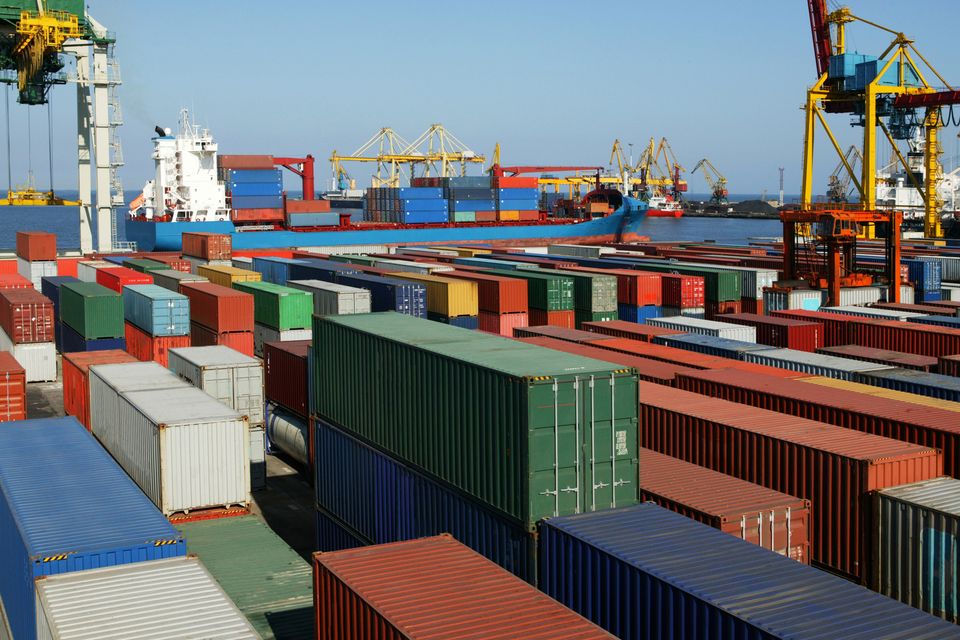Hi-tech Dutch and Belgian ports are next stop for firms
Europe's largest container port, Rotterdam, has set out a blueprint for a future at the vanguard of transport and logistics innovation, driven by efficiencies leveraged through the Internet of Things (IoT) and other digital technologies. Photo: Vitali Afanasopulo
Belgium and the Netherlands look set to become growing ports of call for Irish logistics and technology companies, as some of Europe's largest seaports look to smart technologies to revolutionise their operations.
Europe's largest container port, Rotterdam, has set out a blueprint for a future at the vanguard of transport and logistics innovation, driven by efficiencies leveraged through the Internet of Things (IoT) and other digital technologies. To the south, Antwerp's port authorities are starting ambitious plans to expand the Belgian port by more than 20pc.
This follows a €650m private international investment. Meanwhile, the port of Ghent plans to merge with two ports in Zeeland to make Europe's eighth largest seaport.
These ports support a vast supply chain, logistics and industrial ecosystems. In terms of innovation, they are at a test-bed stage, where technology companies that want to make inroads into supply chains can find some of the most demanding and technically advanced customers.
At an Enterprise Ireland seminar in Dublin this October, we plan to introduce client companies to these large and valuable ecosystems and to highlight opportunities to supply innovative services and solutions to customers in the shipping, rail, fleet management and warehousing sectors.
Rotterdam's Smartest Port initiative has already built up a cluster of companies and projects looking at ways to make shipping and logistics smarter and more sustainable, using technologies ranging from air sensors to monitor air quality to programmes using open data and IoT.
Rotterdam Logistics Lab is the port authority's initiative to bring real-time data sharing to all port users, including inland terminals, liners and shippers. Pilot projects are already under way in supply-chain visibility and port-call optimisation. Industry observers predict that port operations will soon focus as much on managing information as freight. Supported by automated fork-lifts, self-driving trucks, crewless ships and underwater and airborne drones, ultimately, the intelligent container will be able to work its own way through the supply chain.
With the focus on connecting and automating the enabling infrastructure, we expect that Irish ICT providers can have a role to play, especially where they can bring experience from other sectors.
Wicklow-based Druid Software, an Irish company already active in this space, has partnered with a Dutch telecoms and automation specialist Koning & Hartman to deploy private 4G networks at the port of Rotterdam.
The networks provide continuous connectivity between critical machines - such as gantry cranes, container tractor units and bridge cranes - and the port's automation management system to optimise container loading, unloading and stacking.
In another area, the port is piloting a project with IBM and Maersk using blockchain, the much-vaunted virtual ledger technology. It's targeting the paper-based processes in shipping and freight forwarding and replacing them with data-sharing tools.
Antwerp is also working on a blockchain initiative. A Belgian port logistics startup, T-mining, is focusing on the secure handover of goods using blockchain. The process, it is claimed, will improve inventory management and reduce waste, as well as decreasing fraud and error, and cutting down the time that products spend in transit and shipping.
Given that investment decisions in ports and logistics typically involve multimillion-euro contracts, Irish companies need to carefully analyse market trends and understand where they fit in the supply chain, who they should partner with and who they should pitch to.
This, together with an awareness of the subtle differences between Dutch and Flemish business cultures, will play a part in determining the best go-to-market approach.
Francis Simon is a senior market adviser in Enterprise Ireland's Brussels office
Join the Irish Independent WhatsApp channel
Stay up to date with all the latest news















